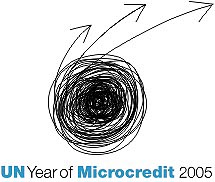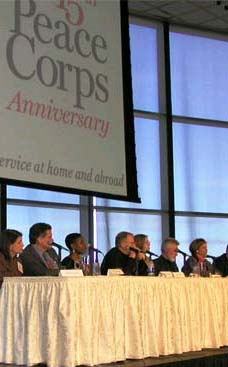
"Microcredit is an almost perfect case of a phenomenon that has come to characterize much of development assistance - a widening gap between reality and propaganda. For while the promise of microcredit is irresistible - help the poor out of poverty using their own entrepreneurial energies, and in the process get our investment back - the hoped for poverty reduction impact of microcredit remains elusive. While much has been learned about managing microcredit in a sound manner, the number of professionally run MFIs with a realistic understanding of the limits of microcredit, is dwarfed by the growing number of newcomers to the field, many of whom trumpet success prematurely, and may cause as much harm as help."
Morocco RPCV Thomas Dichter writes: The Worrisome State of the Microcredit Movement
Hype and Hope: The Worrisome State of the Microcredit Movement
Dichter, T.
Microcredit: All Dressed Up and No Place to Go
Has the widespread enthusiasm for microfinance transformed a noble idea into a panacea? Thomas Dichter, long-time practitioner in the international development industry and author of "Despite Good Intentions: Why Development Assistance to the Third World Has Failed," takes a critical look at the microcredit movement and argues that it has done more harm than good.
The UN’s 2005 "Year of Microcredit" marked the long journey of microcredit from an obscure experiment in the mid 1970s to the status of a worldwide movement. Microcredit has captivated not just the entire development aid industry, but journalists, editorial writers, policy makers and much of the general public in both the North and the South.1 Virtually every development project I see these days, from maternal and child health, to women's education, to soil conservation, to social forestry, to old fashioned integrated rural development, has a "microcredit component," and everyone from camel herders in Mauritania to peasants in rural China can speak the lingo.
Toi vouloir credit moi pas donner toi fache
Moi donner credit toi pas payer moi fache
Moi prefere toi fache
Sign in a restaurant in Dakar, Senegal, 2005. "You want credit me not give, you angry. Me give credit you not pay, me angry. Me rather you angry."
The hope has bred hype. Pro-microcredit editorials abound and scores of books have been published, with titles like the following: The Miracles of Barefoot Capitalism; Pathways Out of Poverty; Hands Around the Globe; Back Alley Banking; Defying the Odds; Give us Credit; The Price of a Dream…
Yet microcredit is an almost perfect case of a phenomenon that has come to characterize much of development assistance - a widening gap between reality and propaganda. For while the promise of microcredit is irresistible - help the poor out of poverty using their own entrepreneurial energies, and in the process get our investment back - the hoped for poverty reduction impact of microcredit remains elusive. While much has been learned about managing microcredit in a sound manner, the number of professionally run MFIs with a realistic understanding of the limits of microcredit, is dwarfed by the growing number of newcomers to the field, many of whom trumpet success prematurely, and may cause as much harm as help.
This dangerous habit is increasingly being displayed not just by naïve celebrities (we all know their names) but by those who ought to know better. In 2004 Kofi Annan stated that "microcredit has been one of the success stories of the last decade," while USAID's microfinance unit claimed that microfinance "has tremendous potential to generate income and expand employment." The website of the "International Year of Microcredit" is even more unequivocal about the development potential of microcredit: "Currently, microentrepreneurs use loans as small as $100 to grow thriving businesses… leading to strong and flourishing local economies."
The Unreasonably High Expectations Surrounding Microcredit
But can microcredit lead to “strong and flourishing local economies,” much less make a real difference in the lives of the poorest?2 We do not have convincing evidence that it can, and in fact the movement engages in little serious impact study. Richard Rosenberg captures the matter of impact succinctly:
"It is notoriously difficult and expensive to quantify household benefits resulting from financial services and to demonstrate causality, so it is not practical for most projects to produce such impact studies."3
The case for microcredit’s impact rests largely on anecdotal evidence that it helps with cash flow smoothing, and can also boost the confidence of women. These are good things, but they are considerably less than the serious long term economic changes that are claimed for the movement. They are not the same as credit used for productivity, job creation and enterprise growth in an increasingly competitive and global economy. If microcredit results only in making the lives of the poor a bit less terrible, or helping just a few real entrepreneurs, is that sufficient reason to laud it? And if borrowers repay microloans does this automatically mean that microcredit is a useful intervention in poverty reduction? And if it is marginally useful, is it cost-effective?
And what about the distinction between informal credit systems (which exist virtually everywhere in the developing world) and the new formalized ones we call microcredit. Why intervene at all if informal systems (like the growing spread of remittance income, or the rotating savings and credit associations run by extended families or groups of friends) already exist?
[Excerpt]
The Rising Hype Has Negatively Affected Even the Modest Gains of Microcredit
Microcredit hype has bred demand to have more donors focus on the field and that has created more microcredit projects and components of projects, to the point where an aid donor and a development program are not perceived as legitimate if they do not have microcredit as part of their portfolio of interventions. As more and more operators have got involved, the quality of microcredit operations has deteriorated just as the serious veteran players have reached the point of perfecting their lending techniques. Microcredit is on the verge of becoming a self-polluting industry.
Microcredit evangelism is a familiar story for our industry: An idea that, after all, can produce some modest changes in the life of poor people (cash flow smoothing, confidence building, etc.) but that really works well only in some circumstances, is carried off by hype and urgency, offered as much more than it really is, and applied everywhere. As it grows it is inevitably caught up in the decades-old incentive structure of the development aid industry - people and institutions are rewarded for mobilizing and moving money, and for acting on the mistaken notion that the way to solve poverty is to go directly to the poor themselves. Since the 1970s, time and again our industry trades- in complex and contextual approaches to development (institutional, legal, governance, and other reforms) for bandaid solutions that produce at best marginal changes, but satisfy the need to be perceived as "doing something for the poor." Again, the question needs to be asked: Is the goal to ease the pain or to cure the disease?
Economic Development is the current frontier of the microcredit movement, and a much tougher challenge. It is easy to give out microcredit, and using best practices developed over the years, even relatively easy to get the money repaid. But the marginal developmental returns from microcredit simply don't warrant the enthusiasm nor the money spent so far. To fulfill the promise of long-term change, much harder things need to be undertaken and these cannot be undertaken everywhere, nor by every player in the development aid business who comes along, because they require sophisticated skills, vision, research, and risky experimentation. To move forward the best operators of microcredit need to become banks, move more seriously into savings mobilization, and learn to deal with banking policy and other (institutional) aspects of the enabling environment. And they need to come to terms with the constraints imposed by political correctness - by being unafraid of lending to real businesses, and unafraid of abandoning the subsistence activities in the informal sector.


















